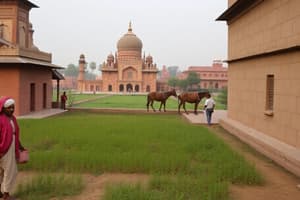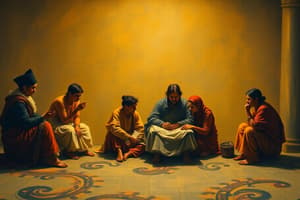Podcast
Questions and Answers
What is the approximate population of India?
What is the approximate population of India?
- 1.4 billion people (correct)
- 2 billion people
- 1 billion people
- 1.8 billion people
How is the caste system in India determined?
How is the caste system in India determined?
- By wealth and income
- By education level
- By occupation
- By birth (correct)
What percentage of Indians practice Hinduism?
What percentage of Indians practice Hinduism?
- 70%
- 80% (correct)
- More than 90%
- 60%
Where is India located in South Asia?
Where is India located in South Asia?
Which terrain is found in northern India?
Which terrain is found in northern India?
What role does religion play in Indian society?
What role does religion play in Indian society?
Which of the following is NOT mentioned as a challenge faced by India?
Which of the following is NOT mentioned as a challenge faced by India?
What type of government has India adopted since its independence?
What type of government has India adopted since its independence?
Which of the following cities is NOT mentioned as one of the world's fastest-growing high-technology centers in India?
Which of the following cities is NOT mentioned as one of the world's fastest-growing high-technology centers in India?
What is the focus of India's strong economy?
What is the focus of India's strong economy?
In what year did India gain independence?
In what year did India gain independence?
Which of the following are mentioned as some of the most populous and cosmopolitan cities in India?
Which of the following are mentioned as some of the most populous and cosmopolitan cities in India?
What type of climate does India NOT have?
What type of climate does India NOT have?
Which of the following phases reflects India's changing relations with the world?
Which of the following phases reflects India's changing relations with the world?
What does India need to address to fully realize its potential?
What does India need to address to fully realize its potential?
What does the text emphasize as key to gaining a deeper appreciation for India's achievements and potential for growth and development?
What does the text emphasize as key to gaining a deeper appreciation for India's achievements and potential for growth and development?
Flashcards are hidden until you start studying
Study Notes
Understanding India
India is a diverse and vibrant country with a rich history and culture that spans thousands of years. It is the world's most populous country, with more than 1.4 billion people, and it has a highly diverse population consisting of various classes, castes, ethnic, and religious groups. India's history is marked by periods of greatness and periods of decline, but it has consistently maintained a high degree of political freedom. In this article, we will explore the key aspects of India's society, history, and economy to provide a comprehensive understanding of the country.
Society and Diversity
India is a unique country with unparalleled diversity in terms of class, caste, ethnic, and religious groups. The country is divided into social ranks called castes, which are determined by birth and almost impossible to change. More than 80% of Indians are Hindu, while 13% are Muslim, and other religions are also represented. India is a spiritual country, and religion plays a significant role in society.
Geography and Climate
India is located in South Asia, surrounded by the Himalaya to the north, the Bay of Bengal to the southeast, and the Arabian Sea to the southwest. The country's terrain varies widely, from the Thar Desert in the west to jungles in the northeast, and the Ganges Plain covers much of northern India. India has a diverse climate, ranging from hot and dry deserts to lush green regions.
History and Political System
India has a long and complex history, with evidence of a highly sophisticated urbanized culture dating back thousands of years. The country became independent in 1947 and has since adopted a parliamentary government, with multiple political parties competing for power. India's foreign policy has evolved through four distinct phases, reflecting its changing relations with the world.
Economy and Technology
India is one of the world's most prosperous countries, with a rapidly growing economy and a strong focus on technology and innovation. The country is home to three of the most populous and cosmopolitan cities in the world—Mumbai, Kolkata, and Delhi. Indian cities like Bengaluru, Chennai, and Hyderabad are among the world's fastest-growing high-technology centers, and many major information technology and software companies have offices in India.
Challenges and Opportunities
Despite its many achievements, India faces several challenges, such as population control, unemployment, and improving the quality of life for its citizens. To fully realize its potential, India needs to address these issues and strengthen the linkage between its diverse regions and populations. By understanding and addressing these challenges, India can continue to grow and evolve as a global power.
In conclusion, India is a fascinating and complex country with a rich history, diverse culture, and a strong focus on technology and innovation. By understanding its society, geography, and economy, we can gain a deeper appreciation for India's achievements and the potential it holds for future growth and development.
Studying That Suits You
Use AI to generate personalized quizzes and flashcards to suit your learning preferences.



